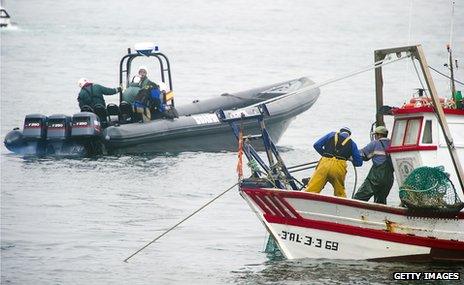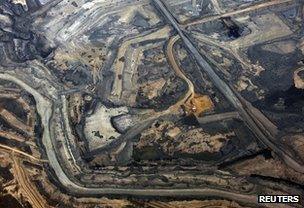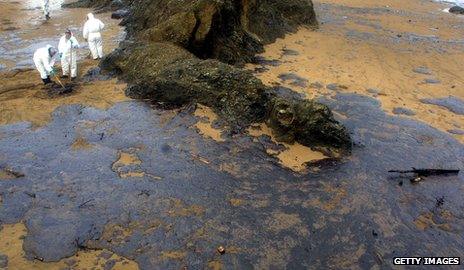Ecocide: A legal green high?
- Published
- comments

At the heart of its official negotiations, the Rio+20 summit is all about looking for political agreements that will improve the lot of society, particularly the poorest, and of nature.
Politics isn't necessarily the best course, nor politicians the best people to plot such a course, to judge by the glacial, boulder-strewn pace of talks here in Rio.
The science is clear on so many of the issues, and ministers acknowledge it - but they see many other factors too, which is why the political response on issues such as climate change often lags way behind the science.
If politics can't get on with it, what about the law?
In 1996, lawyer Mark Gray had a simple vision: make ecocide (destroying nature) a crime.
Well, you might say, any country can do that - and many countries have, in various degrees. Depending on where you live, lighting bush fires, stealing birds' eggs, dumping old motor oil in streams and building on the habitat of a protected newt can all land you in court.
But other nations don't have such laws. Also, activities that harm the natural world sometimes take place beyond national boundaries, such as exploitative high-seas fishing - and some of the worst are performed by companies belonging to one state but operating in the territory of another.

Certain fishing practices could harm the environment
Hence a move several years back by UK barrister Polly Higgins to make ecocide one of the five international "crimes against peace", joining war crimes, genocide, crimes against humanity and the crime of aggression.
The Eradicating Ecocide movement, external isn't talking about slap-on-the-wrist punishments for law-breaking.
Last year they mounted a "trial" trial - a demonstration, if you will - where two CEOs of fictional Canadian tar sands companies faced a court staffed by real lawyers, a real judge and a real jury.

A tar sands mine in Canada
One was "sentenced" to four years in jail.
As well as bosses of misbehaving corporations, the movement believes ministers and heads-of-government that commit or allow ecocide should also stand trial.
And cases could be brought on behalf of inhabitants, whether human or another species.
The Eradicating Ecocide notion has gained some backing - from environmental activists of course, but also, I'm told, some governments, though I'm not aware of any that have gone public with it yet.
The chances of gaining support from all governments would appear to be infinitesimally small, especially given that a number have chosen not to put themselves under the jurisdiction of the International Criminal Court, the body that can hear cases brought under the four existing crimes against peace.
But maybe that doesn't really matter. The main aim is to prevent ecocidal events from occurring in the first place; and if you have a corporation, say, that operates in many countries, some that are parties and some that aren't, it's going to have to adhere to the standards of those that are.
Given where I came into this article, there's an irony here in that we're talking about lawyers saving the environment from lawyers.
Most countries employ lawyers as negotiators in these UN processes, and that's partly why they get so bogged down.
Working out the legal definition of a tree in the Kyoto Protocol, external took years.
Yet in the court arena, the law has the capacity to cut through these very same knots. If your neighbour cuts down what any normal person would call a tree that's standing on your side of the fence, he/she can face punishment, with no arguments about the legal definition of said tree.
So what would a normal person put under the heading of ecocide?
The word gained an airing across the world 40 years ago, at the first UN environment summit in Stockholm, when Sweden's Prime Minister Olof Palme levelled the charge against the US over its use of defoliant chemicals during the war in Vietnam.
In Polly Higgins' vision, ecocidal acts during war are not the main target - they'd be covered under some of the other crimes of peace.
The main concern is what happens during normal times.

The law could cover massive oil leaks
So the law would presumably cover something like a massive oil leak caused by slack or actively risk-taking management, for example.
Would fishing or hunting a species to near-extinction count? What about:
the careless introduction of alien species that out-compete native ones
a mine that pollutes its homeland
over-enthusiastic use of pesticides that removes insect life from a tranche of land
the diversion of a river for irrigation that drains wetlands and their spider inhabitants?
Clearly there are some difficult issues here.
If a company digs a massive mine, for example, there's going to be significant ecological damage in the area. But with will and the right approach, it can be restored after the mine closes.
So would the initial dig qualify as ecocide for the damage it does?
It'll be interesting to see how far the Eradicating Ecocide idea goes in the next few years.
One senses inevitable resistance ahead from a number of very important countries. And dealing with that would be a matter of politics; which in the environmental arena, as we're seeing here in Rio, is often a long and messy business.
A new environmental summit is about to take place in Brazil, 20 years after 172 nations gathered in Rio, for the Earth summit. To find out more about the issues facing the United Nations Conference on Sustainable Development, or Rio+20, see below.

- What is the Rio summit about?






